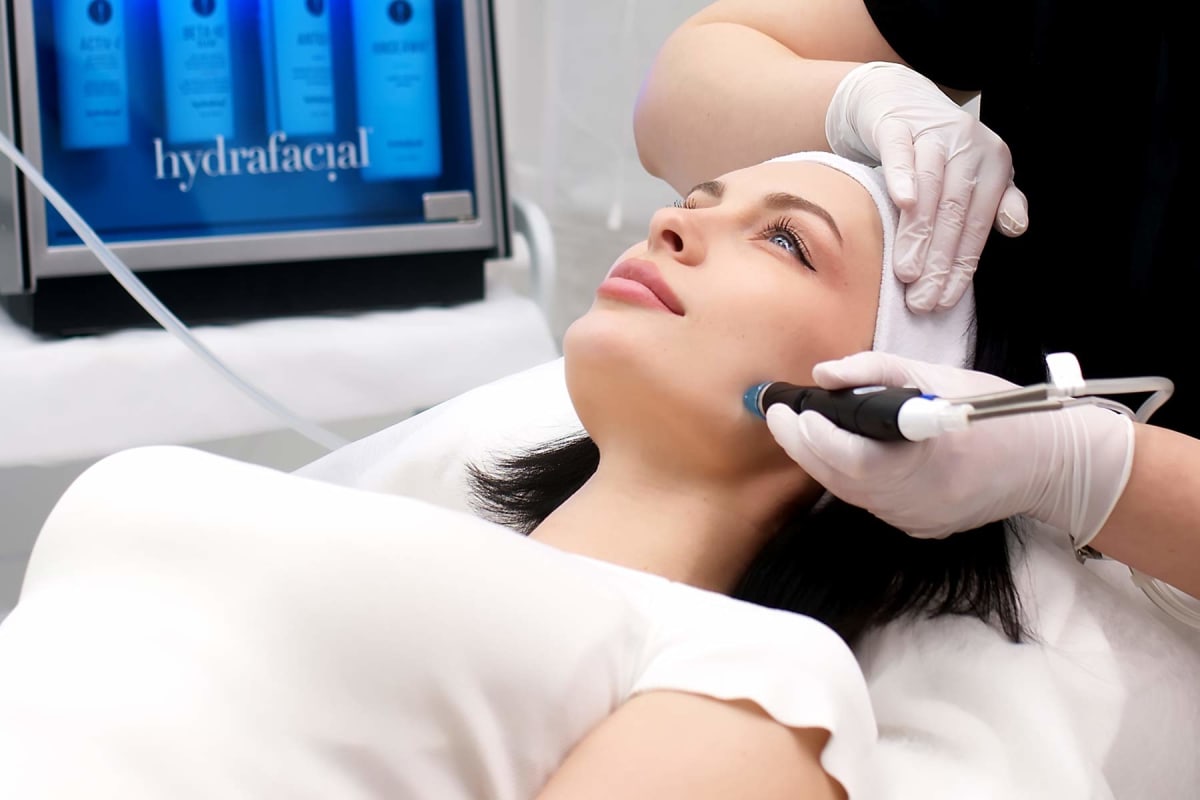
How much does a HydraFacial cost?
How much does a HydraFacial cost?
$150 – $350 average treatment cost
Average HydraFacial price
A HydraFacial costs $150 to $350 per treatment on average, depending on your location, the provider’s experience, the session length, and if you add on any extra treatments or boosters. HydraFacials extract impurities, remove excess sebum, and apply moisturizing serums that leave your skin feeling soft and hydrated.

| National Average Cost | $250 |
| Minimum Cost | $50 |
| Maximum Cost | $375 |
| Average Range | $150 to $350 |
What is a HydraFacial?
A HydraFacial uses a Vortex-Fusion delivery system to remove dead skin cells and deliver chemical exfoliators. It also uses special serums and hyaluronic acid to improve your skin’s tone, texture, and hydration. Results can last for a week or more.
HydraFacial treatments usually take about 30 to 60 minutes. After your treatment, you can return to your regular schedule immediately.
What to expect
During your HydraFacial appointment, the provider will go through three basic steps:
Extraction: The device uses a spiral tip combined with vacuum technology to remove impurities and deliver hydrating compounds into your pores.
Peel: The esthetician or dermatologist uses acids to chemically exfoliate your skin, even skin tone, and prevent acne breakouts. Stronger peels use GlySal (glycolic and salicylic acid), while lighter peels use lactobionic and phytic acid.
Hydration: The device delivers more hydrating serums into your skin as well as antioxidants, which leaves your skin looking dewy and refreshed.
There is no downtime, so aftercare is relatively simple. You should avoid exfoliation and acids on your skin for 24 hours. Other than that, you can go about life as usual. If you experience any flaking, just use a gentle cleanser and moisturizer.

HydraFacial treatment cost factors
Several factors affect the cost of a HydraFacial:
Provider experience: Professionals with more training and experience tend to charge more. Board-certified dermatologists usually charge more than estheticians.
Location: HydraFacial providers in major cities or affluent areas typically charge more for treatments.
Add-ons: Adding extra serums and treatments, or boosters, costs about $40 to $100 extra. Boosters include ingredients like vitamin C, peptides, or niacinamide that treat specific concerns like hyperpigmentation or fine lines.
Keravive: Some providers offer a service called Keravive for an extra fee. This is a hair treatment that uses the same HydraFacial technology on your scalp.
Consultation fee: Many clinics and spas give free consultations, but some charge a consultation fee and add it to your first session.
Discounts: Some medspas and dermatologists offer discounts on bundles or special memberships.
HydraFacial vs. other facial treatments
A HydraFacial is only one of many facials available. The following table shows the cost and features of some of the most common facial treatments:
| Treatment type | Average cost | Details |
|---|---|---|
| HydraFacial | $150 – $350 |
|
| IPL treatment cost | $300 – $600 |
|
| Cryofacial cost | $50 – $300 |
|
| Standard facial cost | $65 – $90 |
|
| Chemical peel cost | $150 – $300 (light) $300 – $1,500 (medium) |
|
| Vampire facial cost | $1,100 – $1,400 |
|
HydraFacial benefits
A HydraFacial can help your skin look cleaner, brighter, and smoother and gives your skin a hydrated, plump appearance. It’s a noninvasive treatment that requires no downtime, and it’s highly customizable. This means you can tweak your treatment based on your personal sensitivity level or concerns.
HydraFacial treatment FAQs
What does a HydraFacial do?
A HydraFacial cleans skin from clogged pores and impurities, evens skin tone, and hydrates your skin. Patients can see a visible difference in skin texture and appearance by the time they leave the spa or dermatologist’s office.
Are HydraFacials worth it?
HydraFacials are worth it for anyone who wants softer skin and a brighter complexion but doesn’t want the downtime associated with standard facials or treatments. Customer reviews of HydraFacial treatments are overwhelmingly positive.
HydraFacials are relatively gentle, so they may not be worth it if you need help with stubborn or severe sunspots, skin conditions, or wrinkles.
How often should you get a HydraFacial?
You can get a HydraFacial as needed or as a one-time treatment, but some dermatologists recommend getting one every 4 to 6 weeks for specific concerns like acne, wrinkles, or hyperpigmentation.
How long does a HydraFacial take?
Most HydraFacial appointments take about 30 to 60 minutes in total. If you add boosters or extra services, your appointment will take longer.
What to look for in a HydraFacial provider
Follow these recommendations to help you choose a qualified facial provider near you:
Weigh the provider's experience and training against their prices.
If you prefer a dermatologist, look for one who is board-certified with FAAD (Fellow of the American Academy of Dermatology) in their title.
Read clients’ reviews on Thervo and Google.
Look at before and after photos of past clients.
Ask them questions about treatment options.
Questions to ask a HydraFacial provider
Asking these questions can help you make an informed choice and confidently pick the best provider for you:
What type of HydraFacial equipment do you use?
How long have you been offering HydraFacial treatments?
What add-ons or boosters do you offer? How much do they cost?
How long do your sessions usually last?
Are there any potential side effects?
Can you show me before-and-after photos of clients?
Do you offer any packages or membership deals?
What other skincare treatments do you recommend?